- Home
- Anne Rivers Siddons
Peachtree Road Page 5
Peachtree Road Read online
Page 5
Ironic, that it was money that built Buckhead, and it is money that is killing it.
But I do not see the Sotheby and Harry Norman and Buckhead Brokers signs, the dark windows, the encroaching weeds where once lawns the color and texture of good billiard tables rolled away. I see, instead, Sarah and Ben and me, in the back garden of 17 Muscogee, running through the dazzling shower from the hose held by Leroy Pickens, the Camerons’ driver, as he washes the identical black Lincoln limousines that Ben Cameron kept. The fine spray rainbows off fenders and tall, mullioned windows and our sleek, tanned hides, tasting warm and metallic and somehow like the red clay of North Georgia, and butterflies dance in the little picking garden, and a hummingbird strafes the roses beyond, just coming into bloom in the formal garden where the gazebo sits, and a fat black crow struts along the high stone wall that snakes around the front courtyard and the boxwood parterre by the sun porch.
“This is the way my daddy takes a bath,” Ben says, leaping high into the shattered rainbow of the water and contorting himself extraordinarily, so that, for a moment, pinned at the apex of the leap against the melting blue of June, he looks fantastically like some slender, small Cossack dancer, or a creature entirely formed of air and dazzle, like Ariel.
“No, like this,” small Sarah chimes, and throws herself high against the blue, curved into a beautiful, brown, unconscious arc like an otter entering water. In that moment Sarah foreshadows the lithe and lovely water creature she will become.
I collapse in laughter in the spray, because the thought of anyone’s parents taking baths at all, even Dorothy and Ben Cameron, Senior, whom I adore, is beyond conception.
“How does your daddy take a bath, Shep?” Ben Cameron says. “I bet he wallows and snorts like a warthog!”
And he mimes that action expertly, so that we see as clearly as if we stood before it the grunting, furious beast, and the stinking, slimy mud, and the vast African plain stretching away. Ben is not being cruel; the analogy of my tight, massive, red father in the mudhole is uncannily apt. And in fact, Ben and Sarah have actually seen a warthog in a mudhole, on a trip to Africa with their parents the preceding spring.
But the laughter drains out of me. I think about it, and then I say, “I don’t think he takes baths.” For the thought of my father wet and naked is light-years beyond my mightiest imagining. I shrink even from the attempt.
“Then he sure must stink,” Ben crows, and collapses in helpless glee.
Sarah stops her capering and glares at him, her great brown eyes thunderous.
“Shep’s right,” she says. “You can just stop laughing, Ben Cameron, because I happen to know that Mama and Daddy don’t really take baths, either.” She turns her eyes to me, and I feel the healing and benediction that flow from them.
“We were just making it up, Shep,” she says. “My mama and daddy never, never, never, never take baths, ever.”
It is an enormous, towering, glorious lie. We laugh, and Leroy Pickens laughs, and water chuckles, and their Scottie, Yappie, does just that, and I run on past this now-dark house that I have always thought, of all the estates in Buckhead, the most romantic.
Left on Rivers Road, past the Slatons’ white wooden Federal. I see Alfreda, small and darting and avian in many crinolines, getting into Tom Goodwin’s 1935 Chevy, which is bereft of fenders and top and muffler, to go to a Phi Chi dance. Tiny Freddie, as pretty as she will ever be, her hand on Tom’s arm tight with promissory possessiveness.
I am with Lucy in the backseat of the Chevy—for it is in the days before the advent of Red Chastain—and Freddie’s sharp little eyes take in the small forest of orchids on Lucy’s dress and wrist and in her hair. They are not mine; they have been sent by the dates she will have for the dance and the breakfast after that, and by her general admirers. It is a barbaric custom, but an immutable one. Freddie wears only Tom’s small purple bloom. His father is not in the same financial league as most of ours, and groves of opulent white orchids are forever beyond Tom. Freddie’s face goes tight and hard.
“Goodness, Lucy, you look like a fruit salad,” she says sweetly, the acid of have-not thin and virulent in her voice. Poor Freddie, she is forever being propelled by her great, formless wanting into competitions where she is outclassed and outmatched.
“I guess I do,” Lucy says in her lazy, smoky drawl. “And you, sweetie, look like an empty salad plate.”
It is a clear victory. Freddie is silent in her pain and rage for the rest of the drive to Brookhaven Country Club. The back of Tom’s neck is dull red, and I glare sternly at Lucy. I am in my Saint Shep the Defender mode, and feminine pain, even Freddie’s, is anathema to me. She glares back and then grins.
“Tough titty,” she whispers. And reluctantly, I grin back.
I run right onto Peachtree Battle Avenue, divided by its wooded park. It is, I think, spring: April, with the new leaves point d’esprit—tender and lacy—and the white stars of the dogwood incandescent in the streetlight. Streetlights through new green…they hang over my childhood and pack my heart tight, the small, perfect icons of the urban child. On down past Woodward Way, and up Dellwood to the right, past the huge, Adamesque pile where Carter Rawson’s family lived. He and Little Lady still live there; the house is awash with light now as it must have been then, though I did not, in those years, know Carter. Indeed, I never went into the house at all until the engagement party that Carter’s parents gave for him and Little Lady, and so what I see now is the long, exquisitely proportioned formal boxwood garden behind the house, leading down a central allée to the domed Ionic gazebo, where Little Lady stands beside Carter framed in Cape jessamine and columns, glowing like a Dresden shepherdess.
“Hello, Mrs. Draper,” Little Lady says sweetly to a formidable, tanklike matron, fluttering her famous feathery, gold-tipped lashes. “Hello, Mrs. Dorsey. You’re mighty sweet to come share this happy day with Carter and me. We hope you’ll be our very first visitors when we get back from Sea Island. We just love the beautiful toast rack; I know it’s a family piece, isn’t it?”
And two old ladies, finally, smile, and Little Lady is launched like a rocket into the ionosphere of Atlanta society.
“Shit,” says Lucy, who is behind me on Red Chastain’s arm, under her breath. “What’s wrong with this picture? I know. There’s no background music. Ought to have an orchestra squatting behind the bushes over there. Playing ‘Fascination.”’
Right on West Wesley and left on Habersham, and long lòpe up to Tom Goodwin’s much smaller house on the right, a neat brick and frame that was built not by Neel Reid or Philip Shutze or anyone else likely to be known in Atlanta, but by a contractor whose firm was a client of Tom’s father, the owner of the city’s first advertising agency. Tom’s family has some money, but not enough, and some background, but not enough, and the house is not nearly grand enough to keep the Goodwins securely in the pantheon in which they teeter. But the location is beyond reproach, and that Habersham Road address and the prospects of one day commanding it will eventually win for Tom the birdlike little hand of Freddie Slaton. Better, I guess, that his father had gone on and bought an affordable bungalow safely across Peachtree Road in Garden Hills, and so beyond the pale.
Right onto the major artery that is West Paces Ferry Road. It runs out to the river, where Hardy Pace did, indeed, operate a ferry, and has now become one of the Northside’s most lamentably snarled traffic arteries from west to east. But in the timestopped nights in which I run, all that can be seen in the darkling woods are the lights of the few big houses on either side. Where the new governor’s mansion—Greek Revival, it is not so fondly known as in some circles—sits now, these thirty years later, there is in my eyes only forest. The great pile of stone just down from it is still the Grant family home, and not the Cherokee Town Club, that unsuccessful pretender to the Driving Club’s throne. Woods, and the smell of honeysuckle and heartbreak, and warm tar in cooling night air, and late-mown grass…and ahead, the scattered lights and
occasional sibilant, swishing traffic sounds of Buckhead proper.
Gaining the familiar intersection of Peachtree, West Paces Ferry, and Roswell roads is like coming out of black, raging Midgard into the eternal radiant whiteness of Valhalla. It has always been so to me. It is all there in that one shabby 1950s crossroads, life and succor and promise and a kind of secular immortality. What power those few dim, perfunctory, yellow and pink and blue neon lights have for the myriad ghosts who flutter like moths around Buckhead! Jim Dickey wrote about it in “Looking for the Buckhead Boys”; that poem took the top of my head off when I first read it, and I tried to find Jim to call him and tell him what it meant to me, but he was out of the state and the South, his sister said, and probably wouldn’t be back anytime soon. Jim knew what it took to survive Buckhead: a kind of distance not measured in miles.
He wrote:
First in the heart
Of my blind spot are
The Buckhead Boys. If I can find them, even one,
I’m home. And if I can find him catch him in or around
Buckhead, I’ll never die; it’s likely my youth will walk
Inside me like a king.
Yes! And I quicken my steps and run into Buckhead. On my right, Wender & Roberts Drugstore, and Lane’s, and just across the street in the arrow tip formed by the confluence of Peachtree and Roswell, Jacob’s Drugs and Madder’s Service Station and above it all the great moon of the Coca-Cola sign. Just past Roswell, the Buckhead Theatre, with the balcony upstairs for the Negroes lucky enough to have the nights off from the big houses all around. I don’t think, excepting servants, there was another black head in North Atlanta in those days. I can see us all, a flock of us, jostling and crowing and knuckling each other on the biceps, walking from Wender & Roberts across the street to the midnight movie. Just up East Paces Ferry there was the taxi stand where even the smallest of us could reach far up to the counter with a penny and receive, in exchange, one cigarette. And Burt’s Bottle Shop, where a lank, depressed bear languished in a cage out in the weedy, cinder-block-littered back.
Across the street where the monolithic and hideous Buckhead Plaza is going up now (unseen, unseen!) was a miniature-auto racetrack, on whose grassy infield Caroline Gentry, Charlie’s little sister, used to tether her pony and cart after driving it in from the Gentrys’ sprawling, stained stucco on West Andrews. From there she’d cross the street to Wender & Roberts and meet, illicitly, Boo Cutler and have a fountain cherry Coke and a package of Tom’s potato chips, and they’d go to the afternoon show at the Buckhead Theatre and neck. Nobody, not Mr. and Mrs. Gentry, not Caroline’s Sunday school teacher, not her teachers at North Fulton High, not Charlie himself, could break that match up.
Boo Cutler. With the drooping-lidded blue eyes and the spoiled, corrupted baby’s face and the bubblegumpink underlip and butter-yellow crew cut and the fastest ’48 Mercury in the South. Boo of the legends and the homeroom whispers: That he ran shine down from Hall County to South Georgia on weekends, and had been shot at many times by police and agents, but never hit. That he had laid more than fifty women by the time he was old enough to drive, and one of them taught at North Fulton. That he had a shotgun in the trunk of the Mercury with notches in it that represented the number of Negroes killed on back country roads in wire-grass South Georgia. That he had done it with a cow.
It was the literal truth, I think, that he ran shine; at any rate, I remember one night when I was fifteen and he was sixteen the word went out that Boo was coming through Buckhead from up in Hall at precisely midnight with a load, and that he had vowed to be going a hundred and twenty when he did it, and that he didn’t care what cops were waiting for him, the Merc could take them all. It was in the late fall, I remember, on a Friday night after a home football game, and we all told our parents we were going to the show, and we went and stood out of sight around the corner on East Paces Ferry and Peachtree in the silent cold, waiting for him. There was, as usual for that time of night, virtually no traffic and few lights except for the marquee farther up at the movie house, and the wind was high and prowling, abroad in the sky, and the silence rang with our efforts to hear his engine. At first, when we did, it was so high and keening that we just thought the wind had intensified. And then Snake Cheatham said, “It’s him. That’s him.”
And we came out of the lee into the full stream of the wind, eyes tearing, and we heard and saw Boo Cutler coming like a devil out of Hell down the empty middle of Peachtree Road, the few sickly streetlights catching the flying Mercury and flinging it along, its engine screaming full-throated and terrible and wonderful.
We did not speak. He was past us and gone down Peachtree Road before we could comprehend the splendor and speed of him, the Merc riding so low that the exhaust bit great fountains of sparks out of the pavement, and before we could even turn our heads to test the new sound, a DeKalb County black-and-white flashed past impossibly far behind him, its siren sounding thin and mewling in contrast to the Mercury’s Valkyrie cry. Both were gone into the silence in an eye-blink, and we did not speak for a moment.
“Jesus Christ, he must have been doing a hundred and forty,” Tom said weakly.
“I just creamed my jeans,” Charlie said reverently.
I remember that I cried, silently in the sheltering dark, and was ashamed of it, but not so ashamed that the memory of that perfect moment does not still have the power, all these years later, to bring tears of joy and thankfulness to my eyes. It was, in its fullness, as round and whole as an egg.
Boo Cutler, Charlie…
Buckhead is called that because a man named Hardy Ivy mounted, in 1838, the head of a buck on a tree over his tavern and crossroads store, and the name stuck among the settlers who met there. The tree on which the grisly trophy hung still stands in the parking lot of a liquor store. Hardy paid $605 for the land that makes up the core of Buckhead, 202 acres where the racetrack sat, and then Sears, and where now Buckhead Plaza is going up. We always heard that there was gold buried in a box under that earth, put there by an old man and his slave during the siege of the city to the south, “out yonder so the damn Yankees won’t get it.”
It was an auspicious omen. Buckhead has always been known, proudly, as the wealthiest unincorporated suburb in America, whether or not the appellation was true. It remained unincorporated only because a stubborn little town also named Buckhead, in Morgan County, refused to surrender its charter and let Buckhead have the name officially, else it would have, early on, been a town proper. It has always considered itself apart both in spirit and in fact from the pushy giant directly to the south, and fought annexation tooth and nail. I remember that when I was ten, the community trounced one attempt and staged a mock funeral, featuring three caskets labeled Mayor Hartsfield, the Atlanta Journal and the Atlanta Constitution, and bore them proudly down the middle of Peachtree Road to the strains of Finlandia played falteringly by the North Fulton High marching band. It wasn’t until 1950 that the city got us, and it remains to many Buckheaders still alive a catastrophe of only slightly less magnitude than the one wrought by General Sherman.
Well. I run out of the beneficence of central Buckhead, then, and back into the dark, pounding south on Peachtree Road. In that earlier country, a dying straggle of stores and businesses stood on either side, and directly beyond them on my left, the subdivision of Garden Hills: firmly middle-class, agreeable and substantial, but another world entirely from the kingdom on the other side of Peachtree Road. It was not until I began high school at North Fulton High, off to my left down Delmont, that I came to know anybody who lived in Garden Hills, and though we children were not, that I remember, snobs in particular—at least not about where people lived—it was as if, in my early childhood, Peachtree Road was as impenetrable and decisive a dividing line as Hadrian’s Wall. Later on, I got to know and like many of my schoolmates who lived Over the Line, and one, A. J. Kemp, became, after Charlie Gentry, perhaps my best friend. But in that first country of childhood, none of
us crossed—or wished to—the Rubicon.
On down Peachtree Road I run, past North Fulton High and Garden Hills Elementary, both out of sight on my left; past, on my right, Saint Philip’s Church, where we went in perfunctory piety each Sunday when it was still a small parish church; past Second Ponce de Leon (Baptist and just a bit below the salt) and the Cathedral of Christ the King (Catholic and resoundingly so); past the last commercial lights and down into the dark of, now, only sleeping houses. Big houses in a line on my right, like the ones on the cloistered streets behind them; houses that could and did shelter princelings and sit out, for an incredible number of years, the siege of the city to the south. Mostly mellow, rosy brick, these few Peachtree Road houses were, two-and three-storied and black- or green-trimmed, some with columns and some with Adam fanlights and fine Georgian facades. Safe, sleeping there in the dark. Safe and dignified and beautiful.
And the last before you reached Muscogee Avenue and the safest and most dignified and, to me, always the most beautiful…my own: 2500 Peachtree Road.
Looking back, it might seem that, in light of my hungry and strictured childhood in that house, my passion for it borders on self-destructiveness. The sane thing to do, for anyone with the slightest bent for survival, would have been to draw in his head and deny in spirit the walls that starved and imprisoned him until the earliest possible opportunity for escape presented itself, and then to leave them behind with no regrets and a singing heart. But those stout, sheltering brick walls were never oppressive to me in themselves; indeed, they were sanctuary and solace whenever my eye or mind fell upon them. And though I did leave them at an early juncture, it was with—for the house, at least—an almost physical stab of sorrow. And when I came back, even though the return was not initially of my own choosing, my heart gave the same small, glad wing-waggle that it always did when I rounded the long curve past Peachtree Battle going north and saw again those soft-rose bricks and the sweetly hipped roof.

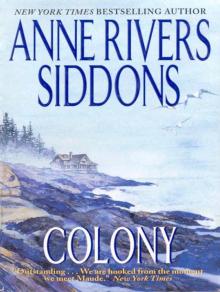 Colony
Colony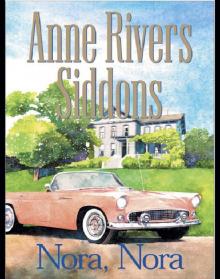 Nora, Nora
Nora, Nora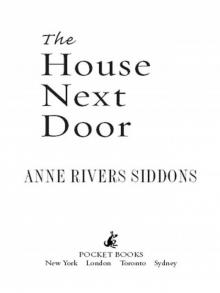 House Next Door
House Next Door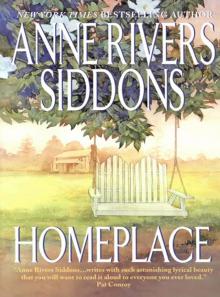 Homeplace
Homeplace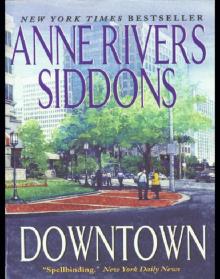 Downtown
Downtown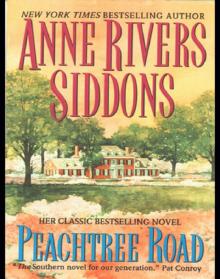 Peachtree Road
Peachtree Road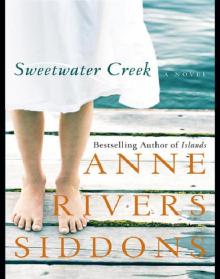 Sweetwater Creek
Sweetwater Creek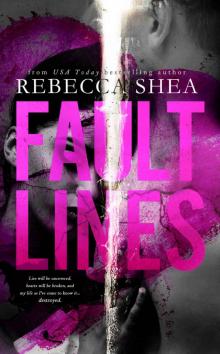 Fault Lines
Fault Lines Low Country
Low Country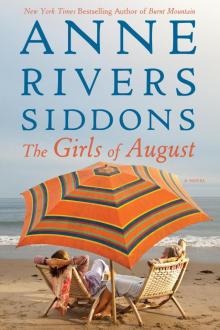 The Girls of August
The Girls of August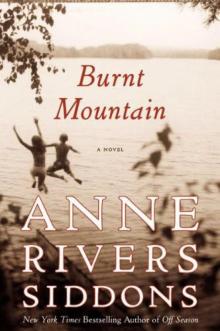 Burnt Mountain
Burnt Mountain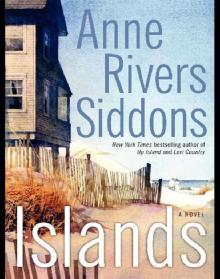 Islands
Islands